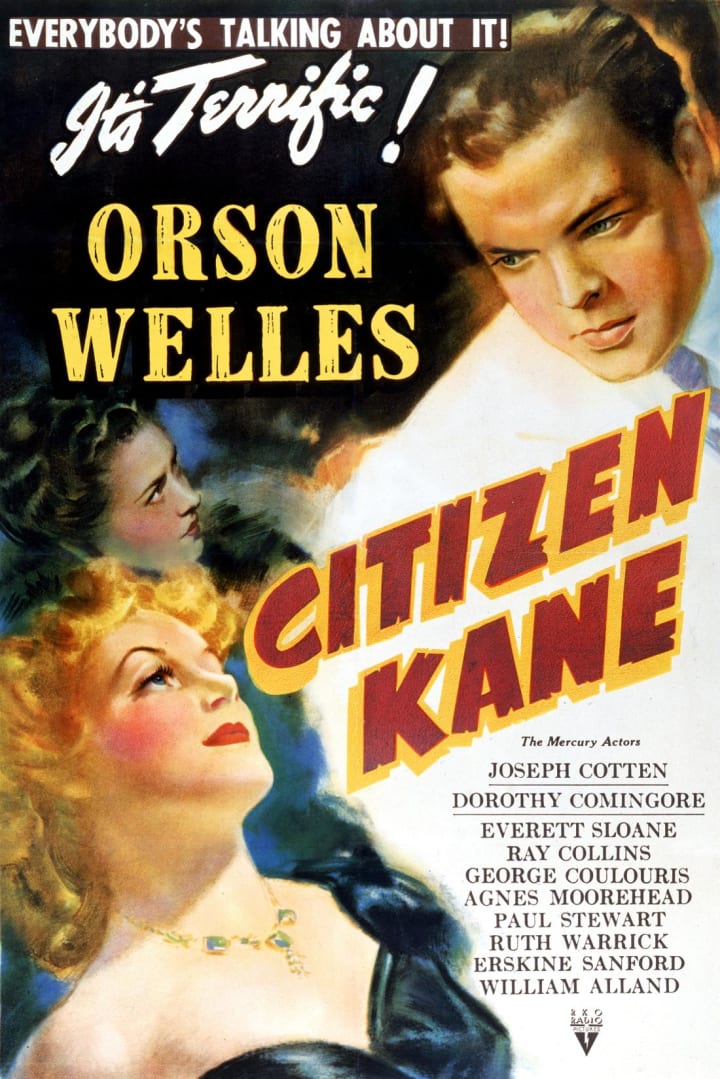What Charles Foster Kane, Alan Jackson, and the Buddha Taught Me About Living
Love isn't all you need, but it does help.

Citizen Kane is an incredible piece of cinema. If you have not yet seen it, I strongly encourage that you do so. It is a great commentary for the life we tend to lead in the 21st Century. The film follows the life of Charles Foster Kane played by the legendary Orson Welles, who is the inheritor of a massive fortune.
In addition to a work of cinematic perfection, the film also projects a message without shoving a message down your throat. I apologize for the spoilers but the film is 78-years-old so I don't feel that bad.
At the beginning of the film, we see Kane (an eccentric billionaire) at the end of his life utter one word, "Rosebud". A few scenes later Kane, a young boy this time is seen outside his family home on a sled in the snow. His mother opts to put him in the care of a well-cultured and well-traveled man Mr. Thatcher, which allows him to live a better life.

These two scenes really make the film what it is. The story follows a reporter who is trying to decipher what Kane meant by his last word, "Rosebud." For the bulk of the film, it's assumed that "Rosebud" refers to a woman. It is only as the film unfolds that this idea becomes less convincing to an audience member.
It seems at the onset that Kane is somewhat of a Bernie Sanders like figure. He runs a newspaper known as "The Inquirer" and uses his money and influence in the press to stick it to the 1% so to speak. He even runs for governor on this platform and it seems as if his intention is quite sincere. What's only revealed near the end of the film is revealed to us by his ex-wife, Susan. She shows that Kane is not driven out of a genuine love for the people but by a desire and unceasing desire to be loved.
The film ends with the reporter not being able to discern the meaning of "Rosebud" insisting that some people mean nothing by some of the words they speak. The scene closes inside Kane's massive mansion in Xanadu, Florida. The camera pans over all of the objects Kane had collected over the years and it is comparable to the storage facility that stores the Ark of the Covenant in Indiana Jones: Raiders of the Lost Ark.
You almost get the sense that Kane perhaps was speaking gibberish and that perhaps like his life filled with empty material goods, one-sided relationships, and more money than he knew what to do with, Kane was just void of any real depth. The very last item in the mass of objects that is seen is the little sled that was from the beginning of the film, with the name of the manufacturer printed on it. The manufacturer is called "Rosebud."
The sled is thrown into a massive furnace and you see the words "Rosebud" incinerated from the sled. The final shot shows the outside of his lavish estate far off on a hill with a fence in the foreground that has a sign on it that says "No Trespassing!"
Now, of course, I hope that each person goes and watches the film for themselves and finds their own meanings from it. I will just give my interpretation of what I think this final scene symbolizes and what the film seems to be a metaphor. However, I'd love to hear other interpretations.
One thing that resonates throughout the film is that Kane is a hard man to get close to. He's not even understood by those closest to him as is mentioned several times in the film. The film does this both by telling it and showing it. At the final part of the film when he's alone with Susan, there's usually a massive distance between them. Susan is always shown doing jigsaw puzzles. Even his own wife, the person who could be considered closest to him, cannot figure him out. Once she has a picture of him, a new one emerges as soon as the old one disappears.

The distance between Kane and Susan is a triumph of cinematography.
The distance grows between them physically in these series of scenes. The scope of the room makes their figures indiscernible to one another. When both characters are shown in their fullness, it is in a bedroom and Susan is going to leave Kane. Once she leaves him, Kane has a massive freak out, destroying everything. As if to symbolize those moments of intimacy and real human connection are too painful and can only be handled in a childlike way through outrage.
In the midst of destroying everything, he finds a snowglobe and says, "Rosebud" and exits the room in a daze and shortly thereafter he dies. The snowglobe seems to remind him of those moments on the sled in his home of Colorado as if he's gotten back in touch with the childhood that he was robbed of in the mess that became his life.
It is clear that what Kane is feeling is not anger, but hurt and a sense of being unloved. His wife left him just like his mother abandoned him. It all comes back full circle. That this person is deeply troubled and the person he let in, the person he let get close to him in a way that he hadn't experienced since his mother's betrayal hurt him the same way.
The film was written by Orson Welles, but it could have just as easily been written by a Buddhist. The metaphors for the dangers of consumerism, and how no amount of possessions will make you happy. These things like material goods, accomplishments while very nice in and of themselves will never truly do what true relationships do. It is an empty existence as demonstrated by the emptiness of his mansion.
The country singer Alan Jackson wrote one of my favorite songs called "Livin' on Love." In the song one of the lyrics that kept replaying as I watched the film was "Without somebody, nothing ain't worth a dime" and Charles Foster Kane is a testament to that. At the core Kane needed to be loved and he lived his life trying to buy that same satisfaction.
What the film echoes time and time again is that in order to live the best life we need to open our hearts and be open to love and be open to give love. Kane was willing to receive love but in a way a child is dependent on love but is unsure how to reciprocate that love, Kane also had a difficult time trying to give it. This film made me reevaluate my own life and I imagine I am not the only one who has been moved by it. Sometimes we just need to remember in the hustle and bustle of our daily lives that,
"Without somebody, nothing ain't worth a dime."
About the Creator
Graham O'Shaughnessy
I am an alumnus from the University of Redlands. I earned my B.A. in Philosophy and am in the process of going to Grad School to earn my MA in humanities. I like to write about my love of philosophy, mythology, fiction, and storytelling.






Comments
There are no comments for this story
Be the first to respond and start the conversation.